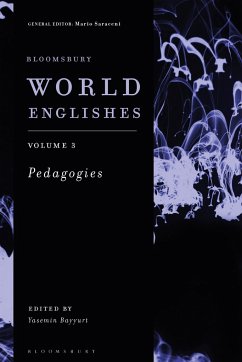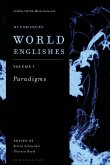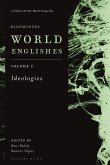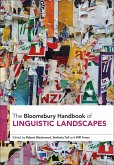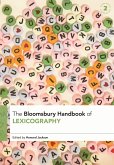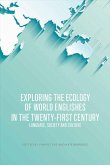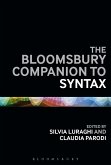Bloomsbury World Englishes Volume 3: Pedagogies
Herausgeber: Bayyurt, Yasemin; Saraceni, Mario
Bloomsbury World Englishes Volume 3: Pedagogies
Herausgeber: Bayyurt, Yasemin; Saraceni, Mario
- Gebundenes Buch
- Merkliste
- Auf die Merkliste
- Bewerten Bewerten
- Teilen
- Produkt teilen
- Produkterinnerung
- Produkterinnerung
Bloomsbury World Englishes offers a comprehensive and rigorous description of the facts, implications and contentious issues regarding the forms and functions of English in the world. International experts cover a diverse range of varieties and topics, offering a more accurate understanding of English across the globe and the various social contexts in which it plays a significant role. With volumes dedicated to research paradigms, language ideologies and pedagogies, the collection pushes the boundaries of the field to go beyond traditional descriptive paradigms and contribute to moving…mehr
Andere Kunden interessierten sich auch für
![Bloomsbury World Englishes Volume 1: Paradigms Bloomsbury World Englishes Volume 1: Paradigms]() Bloomsbury World Englishes Volume 1: Paradigms263,99 €
Bloomsbury World Englishes Volume 1: Paradigms263,99 €![Bloomsbury World Englishes Volume 2: Ideologies Bloomsbury World Englishes Volume 2: Ideologies]() Bloomsbury World Englishes Volume 2: Ideologies258,99 €
Bloomsbury World Englishes Volume 2: Ideologies258,99 €![The Bloomsbury Handbook of Linguistic Landscapes The Bloomsbury Handbook of Linguistic Landscapes]() The Bloomsbury Handbook of Linguistic Landscapes226,99 €
The Bloomsbury Handbook of Linguistic Landscapes226,99 €![The Bloomsbury Handbook of Lexicography The Bloomsbury Handbook of Lexicography]() The Bloomsbury Handbook of Lexicography228,99 €
The Bloomsbury Handbook of Lexicography228,99 €![Global Englishes Global Englishes]() Will BakerGlobal Englishes206,99 €
Will BakerGlobal Englishes206,99 €![Exploring the Ecology of World Englishes in the Twenty-First Century Exploring the Ecology of World Englishes in the Twenty-First Century]() Exploring the Ecology of World Englishes in the Twenty-First Century167,99 €
Exploring the Ecology of World Englishes in the Twenty-First Century167,99 €![The Bloomsbury Companion to Syntax The Bloomsbury Companion to Syntax]() The Bloomsbury Companion to Syntax317,99 €
The Bloomsbury Companion to Syntax317,99 €-
-
-
Bloomsbury World Englishes offers a comprehensive and rigorous description of the facts, implications and contentious issues regarding the forms and functions of English in the world. International experts cover a diverse range of varieties and topics, offering a more accurate understanding of English across the globe and the various social contexts in which it plays a significant role. With volumes dedicated to research paradigms, language ideologies and pedagogies, the collection pushes the boundaries of the field to go beyond traditional descriptive paradigms and contribute to moving research agendas forward. Volume 3: Pedagogies addresses the teaching of English as a world language. Chapters in this volume consider the teaching and learning of English(es) from a range of perspectives and on the basis of experiences and research from many parts of the world.
Hinweis: Dieser Artikel kann nur an eine deutsche Lieferadresse ausgeliefert werden.
Hinweis: Dieser Artikel kann nur an eine deutsche Lieferadresse ausgeliefert werden.
Produktdetails
- Produktdetails
- Verlag: Taylor & Francis Ltd (Sales)
- Seitenzahl: 320
- Erscheinungstermin: 1. Juli 2021
- Englisch
- Abmessung: 246mm x 175mm x 30mm
- Gewicht: 726g
- ISBN-13: 9781350065888
- ISBN-10: 1350065889
- Artikelnr.: 61962566
- Herstellerkennzeichnung
- Libri GmbH
- Europaallee 1
- 36244 Bad Hersfeld
- gpsr@libri.de
- Verlag: Taylor & Francis Ltd (Sales)
- Seitenzahl: 320
- Erscheinungstermin: 1. Juli 2021
- Englisch
- Abmessung: 246mm x 175mm x 30mm
- Gewicht: 726g
- ISBN-13: 9781350065888
- ISBN-10: 1350065889
- Artikelnr.: 61962566
- Herstellerkennzeichnung
- Libri GmbH
- Europaallee 1
- 36244 Bad Hersfeld
- gpsr@libri.de
Yasemin Bayyurt is Professor of Applied Linguistics at Bogaziçi University, Turkey. General Editor: Mario Saraceni
List of Figures List of Tables List of Contributors Prologue
Jennifer Jenkins (University of Southampton
UK) and Lucilla Lopriore (Roma Tre University
Italy) Introduction
Yasemin Bayyurt (Bogaziçi University
Turkey) Part 1: General Principles 1. Incorporating Ontological Reflection into Teacher Education about English for Global Learners: A Rationale and some Guiding Principles
Chris Hall (York St John University
UK) 2. English Language Development in the Global Classroom: Revisiting Key Constructs of Second Language Acquisition Theory
Dustin Crowther (University of Hawai'i at Manoa
USA) 3. Moving from Conceptualizations to Implementation of a Global Englishes Perspective in ELT: Critical Issues in Pedagogy
Seran Dogançay-Aktuna (Southern Illinois University Edwardsville
USA) and Joel Hardman (Southern Illinois University Edwardsville
USA) 4. World Englishes
English as a Lingua Franca and ELT Materials: A Critical Perspective
Paola Vettorel (University of Verona
Italy) 5. Materials and Activities in Teaching English as a Global Language: Using Online Resources to Stimulate Innovation
Mona Syrbe (Rikkyo University
Japan) and Heath Rose (University of Oxford
UK) Part 2: Native Speakerism 6. Negotiating Nativespeakerism in TESOL Curriculum Innovation
Nicola Galloway (University of Glasgow
UK) 7. Beyond 'Native' and 'Non-Native' English-Speaking Teachers: Teacher Identity and the Knowledge Base of Global Englishes Language Teachers
Ali Fuad Selvi (METU Northern Cyprus Campus
Cyprus) and Bedrettin Yazan (University of Texas
San Antonio
USA) 8. Re-Conceptualizing (Non-)Native English Speakers within the Paradigm of Teaching English as an International Language
Aya Matsuda (Arizona State University
USA) 9. Tackling Native-Speakerism through ELF-Aware Pedagogy
Rob Lowe (Tokyo Kasei University
Japan) and Marek Kiczkowiak (TEFL Equity Advocates & Academy
Leuven
Belgium) Part 3: English as a Medium Of Instruction 10. Teaching WE and ELF in EMI from an ELF Perspective: A Case Study at a University in the Expanding Circle
Kumiko Murata (Waseda University
Japan) 11. Implementing Critical Pedagogy of Global Englishes in ELT in Asia from the Lens of EMI and Intercultural Citizenship
Fan Fang (Shantou University
China) and Will Baker (University of Southampton
UK) 12. Problematizing EMI Programs in Turkish Higher Education: Voices from Stakeholders
Dilek Inal (Istanbul University- Cerrahpasa
Turkey)
Yasemin Bayyurt (Bogaziçi University
Turkey) and Feza Kerestecioglu (Kadir Has University
Turkey) 13. A Critical View of Globalization within the Expanded Role of EMI in Japan: Case Study of an Actual Implementation
Jim D'Angelo (Chukyo University
Nagoya
Japan) Part 4: Focus on Specific Contexts 14. The Impact of World Englishes and English as a Lingua Franca in Tertiary Education in the Expanding Circle
Enric Llurda (University of Lleida
Spain) and Guzman Mancho-Barés (University of Lleida
Spain) 15. World Englishes and Critical Pedagogy: Reflections on Paulo Freire's Contributions to the Brazilian National English as a Lingua Franca (ELF) Curriculum
Savio Siqueira (Bahia Federal University
Brazil) and Telma Gimenez (Universidade Estadual de Londrina
Brazil) 16. Teaching English from a Critical Intercultural Perspective: An Experience with Afro Colombian and Indigenous Students
Claudia Gutiérrez (University of Washington
USA)
Janeth Ortiz and Jaime Usma (Universidad de Antioquia
Colombia) 17. English Medium Instruction and Language Planning in Post-Colonial Contexts: Implications for Heritage Language Development
Nkoko Kamwangamalu (Howard University
Washington
USA) Index
Jennifer Jenkins (University of Southampton
UK) and Lucilla Lopriore (Roma Tre University
Italy) Introduction
Yasemin Bayyurt (Bogaziçi University
Turkey) Part 1: General Principles 1. Incorporating Ontological Reflection into Teacher Education about English for Global Learners: A Rationale and some Guiding Principles
Chris Hall (York St John University
UK) 2. English Language Development in the Global Classroom: Revisiting Key Constructs of Second Language Acquisition Theory
Dustin Crowther (University of Hawai'i at Manoa
USA) 3. Moving from Conceptualizations to Implementation of a Global Englishes Perspective in ELT: Critical Issues in Pedagogy
Seran Dogançay-Aktuna (Southern Illinois University Edwardsville
USA) and Joel Hardman (Southern Illinois University Edwardsville
USA) 4. World Englishes
English as a Lingua Franca and ELT Materials: A Critical Perspective
Paola Vettorel (University of Verona
Italy) 5. Materials and Activities in Teaching English as a Global Language: Using Online Resources to Stimulate Innovation
Mona Syrbe (Rikkyo University
Japan) and Heath Rose (University of Oxford
UK) Part 2: Native Speakerism 6. Negotiating Nativespeakerism in TESOL Curriculum Innovation
Nicola Galloway (University of Glasgow
UK) 7. Beyond 'Native' and 'Non-Native' English-Speaking Teachers: Teacher Identity and the Knowledge Base of Global Englishes Language Teachers
Ali Fuad Selvi (METU Northern Cyprus Campus
Cyprus) and Bedrettin Yazan (University of Texas
San Antonio
USA) 8. Re-Conceptualizing (Non-)Native English Speakers within the Paradigm of Teaching English as an International Language
Aya Matsuda (Arizona State University
USA) 9. Tackling Native-Speakerism through ELF-Aware Pedagogy
Rob Lowe (Tokyo Kasei University
Japan) and Marek Kiczkowiak (TEFL Equity Advocates & Academy
Leuven
Belgium) Part 3: English as a Medium Of Instruction 10. Teaching WE and ELF in EMI from an ELF Perspective: A Case Study at a University in the Expanding Circle
Kumiko Murata (Waseda University
Japan) 11. Implementing Critical Pedagogy of Global Englishes in ELT in Asia from the Lens of EMI and Intercultural Citizenship
Fan Fang (Shantou University
China) and Will Baker (University of Southampton
UK) 12. Problematizing EMI Programs in Turkish Higher Education: Voices from Stakeholders
Dilek Inal (Istanbul University- Cerrahpasa
Turkey)
Yasemin Bayyurt (Bogaziçi University
Turkey) and Feza Kerestecioglu (Kadir Has University
Turkey) 13. A Critical View of Globalization within the Expanded Role of EMI in Japan: Case Study of an Actual Implementation
Jim D'Angelo (Chukyo University
Nagoya
Japan) Part 4: Focus on Specific Contexts 14. The Impact of World Englishes and English as a Lingua Franca in Tertiary Education in the Expanding Circle
Enric Llurda (University of Lleida
Spain) and Guzman Mancho-Barés (University of Lleida
Spain) 15. World Englishes and Critical Pedagogy: Reflections on Paulo Freire's Contributions to the Brazilian National English as a Lingua Franca (ELF) Curriculum
Savio Siqueira (Bahia Federal University
Brazil) and Telma Gimenez (Universidade Estadual de Londrina
Brazil) 16. Teaching English from a Critical Intercultural Perspective: An Experience with Afro Colombian and Indigenous Students
Claudia Gutiérrez (University of Washington
USA)
Janeth Ortiz and Jaime Usma (Universidad de Antioquia
Colombia) 17. English Medium Instruction and Language Planning in Post-Colonial Contexts: Implications for Heritage Language Development
Nkoko Kamwangamalu (Howard University
Washington
USA) Index
List of Figures List of Tables List of Contributors Prologue
Jennifer Jenkins (University of Southampton
UK) and Lucilla Lopriore (Roma Tre University
Italy) Introduction
Yasemin Bayyurt (Bogaziçi University
Turkey) Part 1: General Principles 1. Incorporating Ontological Reflection into Teacher Education about English for Global Learners: A Rationale and some Guiding Principles
Chris Hall (York St John University
UK) 2. English Language Development in the Global Classroom: Revisiting Key Constructs of Second Language Acquisition Theory
Dustin Crowther (University of Hawai'i at Manoa
USA) 3. Moving from Conceptualizations to Implementation of a Global Englishes Perspective in ELT: Critical Issues in Pedagogy
Seran Dogançay-Aktuna (Southern Illinois University Edwardsville
USA) and Joel Hardman (Southern Illinois University Edwardsville
USA) 4. World Englishes
English as a Lingua Franca and ELT Materials: A Critical Perspective
Paola Vettorel (University of Verona
Italy) 5. Materials and Activities in Teaching English as a Global Language: Using Online Resources to Stimulate Innovation
Mona Syrbe (Rikkyo University
Japan) and Heath Rose (University of Oxford
UK) Part 2: Native Speakerism 6. Negotiating Nativespeakerism in TESOL Curriculum Innovation
Nicola Galloway (University of Glasgow
UK) 7. Beyond 'Native' and 'Non-Native' English-Speaking Teachers: Teacher Identity and the Knowledge Base of Global Englishes Language Teachers
Ali Fuad Selvi (METU Northern Cyprus Campus
Cyprus) and Bedrettin Yazan (University of Texas
San Antonio
USA) 8. Re-Conceptualizing (Non-)Native English Speakers within the Paradigm of Teaching English as an International Language
Aya Matsuda (Arizona State University
USA) 9. Tackling Native-Speakerism through ELF-Aware Pedagogy
Rob Lowe (Tokyo Kasei University
Japan) and Marek Kiczkowiak (TEFL Equity Advocates & Academy
Leuven
Belgium) Part 3: English as a Medium Of Instruction 10. Teaching WE and ELF in EMI from an ELF Perspective: A Case Study at a University in the Expanding Circle
Kumiko Murata (Waseda University
Japan) 11. Implementing Critical Pedagogy of Global Englishes in ELT in Asia from the Lens of EMI and Intercultural Citizenship
Fan Fang (Shantou University
China) and Will Baker (University of Southampton
UK) 12. Problematizing EMI Programs in Turkish Higher Education: Voices from Stakeholders
Dilek Inal (Istanbul University- Cerrahpasa
Turkey)
Yasemin Bayyurt (Bogaziçi University
Turkey) and Feza Kerestecioglu (Kadir Has University
Turkey) 13. A Critical View of Globalization within the Expanded Role of EMI in Japan: Case Study of an Actual Implementation
Jim D'Angelo (Chukyo University
Nagoya
Japan) Part 4: Focus on Specific Contexts 14. The Impact of World Englishes and English as a Lingua Franca in Tertiary Education in the Expanding Circle
Enric Llurda (University of Lleida
Spain) and Guzman Mancho-Barés (University of Lleida
Spain) 15. World Englishes and Critical Pedagogy: Reflections on Paulo Freire's Contributions to the Brazilian National English as a Lingua Franca (ELF) Curriculum
Savio Siqueira (Bahia Federal University
Brazil) and Telma Gimenez (Universidade Estadual de Londrina
Brazil) 16. Teaching English from a Critical Intercultural Perspective: An Experience with Afro Colombian and Indigenous Students
Claudia Gutiérrez (University of Washington
USA)
Janeth Ortiz and Jaime Usma (Universidad de Antioquia
Colombia) 17. English Medium Instruction and Language Planning in Post-Colonial Contexts: Implications for Heritage Language Development
Nkoko Kamwangamalu (Howard University
Washington
USA) Index
Jennifer Jenkins (University of Southampton
UK) and Lucilla Lopriore (Roma Tre University
Italy) Introduction
Yasemin Bayyurt (Bogaziçi University
Turkey) Part 1: General Principles 1. Incorporating Ontological Reflection into Teacher Education about English for Global Learners: A Rationale and some Guiding Principles
Chris Hall (York St John University
UK) 2. English Language Development in the Global Classroom: Revisiting Key Constructs of Second Language Acquisition Theory
Dustin Crowther (University of Hawai'i at Manoa
USA) 3. Moving from Conceptualizations to Implementation of a Global Englishes Perspective in ELT: Critical Issues in Pedagogy
Seran Dogançay-Aktuna (Southern Illinois University Edwardsville
USA) and Joel Hardman (Southern Illinois University Edwardsville
USA) 4. World Englishes
English as a Lingua Franca and ELT Materials: A Critical Perspective
Paola Vettorel (University of Verona
Italy) 5. Materials and Activities in Teaching English as a Global Language: Using Online Resources to Stimulate Innovation
Mona Syrbe (Rikkyo University
Japan) and Heath Rose (University of Oxford
UK) Part 2: Native Speakerism 6. Negotiating Nativespeakerism in TESOL Curriculum Innovation
Nicola Galloway (University of Glasgow
UK) 7. Beyond 'Native' and 'Non-Native' English-Speaking Teachers: Teacher Identity and the Knowledge Base of Global Englishes Language Teachers
Ali Fuad Selvi (METU Northern Cyprus Campus
Cyprus) and Bedrettin Yazan (University of Texas
San Antonio
USA) 8. Re-Conceptualizing (Non-)Native English Speakers within the Paradigm of Teaching English as an International Language
Aya Matsuda (Arizona State University
USA) 9. Tackling Native-Speakerism through ELF-Aware Pedagogy
Rob Lowe (Tokyo Kasei University
Japan) and Marek Kiczkowiak (TEFL Equity Advocates & Academy
Leuven
Belgium) Part 3: English as a Medium Of Instruction 10. Teaching WE and ELF in EMI from an ELF Perspective: A Case Study at a University in the Expanding Circle
Kumiko Murata (Waseda University
Japan) 11. Implementing Critical Pedagogy of Global Englishes in ELT in Asia from the Lens of EMI and Intercultural Citizenship
Fan Fang (Shantou University
China) and Will Baker (University of Southampton
UK) 12. Problematizing EMI Programs in Turkish Higher Education: Voices from Stakeholders
Dilek Inal (Istanbul University- Cerrahpasa
Turkey)
Yasemin Bayyurt (Bogaziçi University
Turkey) and Feza Kerestecioglu (Kadir Has University
Turkey) 13. A Critical View of Globalization within the Expanded Role of EMI in Japan: Case Study of an Actual Implementation
Jim D'Angelo (Chukyo University
Nagoya
Japan) Part 4: Focus on Specific Contexts 14. The Impact of World Englishes and English as a Lingua Franca in Tertiary Education in the Expanding Circle
Enric Llurda (University of Lleida
Spain) and Guzman Mancho-Barés (University of Lleida
Spain) 15. World Englishes and Critical Pedagogy: Reflections on Paulo Freire's Contributions to the Brazilian National English as a Lingua Franca (ELF) Curriculum
Savio Siqueira (Bahia Federal University
Brazil) and Telma Gimenez (Universidade Estadual de Londrina
Brazil) 16. Teaching English from a Critical Intercultural Perspective: An Experience with Afro Colombian and Indigenous Students
Claudia Gutiérrez (University of Washington
USA)
Janeth Ortiz and Jaime Usma (Universidad de Antioquia
Colombia) 17. English Medium Instruction and Language Planning in Post-Colonial Contexts: Implications for Heritage Language Development
Nkoko Kamwangamalu (Howard University
Washington
USA) Index

